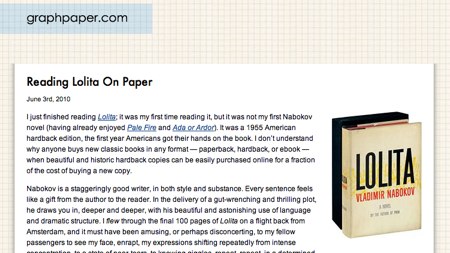Fetishizing the Codex
Stacey Mason

At the recent ELO conference, Terry Harpold presented a paper on the eBook as a a fetishized version of the codex, citing the ways in which we have become aware of the book’s properties as a technology and have fetishized selective traits. Yet we still can’t grasp the intangibles that we believe eBooks lack. TPage-turning animations and the loving rendition of page edges at the border of the iPad serve both to represent and to remind us of the original object.
In light of Harpold’s argument, I was struck by Christopher Fahey’s interesting anecdote on reading Lolita in print.
And what delight as, finishing the third to last, right-side-facing page, I turned to the final spread, one-and-one-half pages of text, and unexpectedly found some of the most heartbreaking words of the whole novel, right at the top of the penultimate page, the finish line within sight: an experience that was both textual and physical in its manifestation. Was it the author, the typesetter, both, or neither, who constructed — designed — this neat, sublime, perfectly-timed emotional jolt?
Even before he expressly draws his conclusion, I couldn’t help but think that some of the phenomena of reading Lolita that he describes—your eyes scanning the page for certain keywords, longing for them—would be changed on the reader I use, since the page breaks change with the adjustable font size.
